Mental health is something of a taboo subject in the workplace, particularly in construction. In its latest report, the Health and Safety Executive states depression and anxiety account for 44% of all work-related ill health, with a further 54% of all working days lost to psychological stress. Stuart Russell, commercial manager at CPI EuroMix, discusses the steps construction companies can take to remedy the symptoms of stress and poor mental health before the afflictions can take full effect.
Although the industry is doing well to rebalance its gender disproportion, remnants of the ‘strong and tough’ stereotype associated with male construction workers still, unfortunately, exists, putting men at an extreme disadvantage.
If we concur with this stereotypical view, then construction workers are as tough as the boots on their feet; they’re insensitive to the perils they face in their line of duty, and they’re mostly easy-going types whose hard-earned brawn has insulated them against the fears and anxieties felt by those engaged in less rigorous employment. The reality is somewhat different, however.
Industry stressors
Construction is a tough environment to inhabit. Figures from insurance company AXA’s ‘2018 Stress Index’ highlights 82% of workers in building and construction experienced stress during working and non-working hours in the week; with 42% experiencing some level of anxiety.
This worrying level of stress is a result of tight project deadlines, long working hours and physical exertion. Deadlines need to be met on a daily basis to satisfy a seemingly never-ending chain of command that begins with the client, but can include a host of contractors and various trades, which are dependent on a person a lot further down the line getting their bit right for a project to proceed at sufficient speed.
Altogether, this irrepressible combination of physical and mental strain eventually takes its toll on mental health. For the sake of its employees, the industry would do well to confront these issues. Mental health must be dealt with transparently, realistically and sensitively, filtering down from senior management to the general workforce.
Thankfully, it appears the industry itself is becoming aware of the health issues in its midst. Initiatives such as Mates in Mind, a recently-launched charitable programme designed to improve and promote positive mental health in construction, has the backing of the British Safety Council, the Health in Construction Leadership Group, and the Samaritans.
Spotting the signs
In order to prevent minor stress from manifesting into unmanageable mental health issues, it is crucial to take note of any of the following signs. If you’re noticing a fellow colleague under stress or strain, be sure to keep an eye out for: unexplained absenteeism, detachment from peers, lack of self-confidence and decreased problem-solving ability. Be mindful of the fact their mental health might reveal itself in more physical problems such as headaches, sickness or fatigue. A combination of these factors might be present; alternatively, one or two might exist in isolation. Diagnosing mental health is a very difficult process, and there is no single cause or remedy. Either way, it is crucial to be able to preempt an issue before it becomes a huge problem.
Here at CPI Euromix, we feel it is extremely important to raise awareness on the subject of mental health and reassure our employees that the support is there if and when required. Mental health issues reportedly account for people taking nearly 70 million days off sick per year – the most of any health condition – costing the UK economy between £70 billion and £100 billion a year. Proof, therefore, the ramifications of this debilitating condition can travel far beyond the distress it causes an individual.
Working environments have an effect on mental health, which is why it is important to create a culture which allows employees to feel relaxed and comfortable at work. Whether this is a simple ‘How are you doing today?’ or making time for breaks, either can go a long way in making workers feel appreciated.
The construction industry has been viewed by some as resistant to adapting to changes in working practices and behaviours, but it’s been swift to act in relation to a hitherto unspoken issue: the psychological wellbeing of its employees. At CPI Euromix, we are aiming to overturn the negative view of mental illness and open-up discussion about its causes, symptoms and diagnoses. In our opinion, the construction industry should approach the welfare of its members with the same precision applied to a high-profile building or engineering project, which means paying as much attention to the interior, as well as the exterior details.




